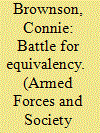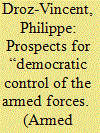|
|
|
Sort Order |
|
|
|
Items / Page
|
|
|
|
|
|
|
| Srl | Item |
| 1 |
ID:
135996


|
|
|
|
|
| Summary/Abstract |
Drawing from the concept of citizenship in the novel, Starship Troopers, we consider public opinion in a world in which “service guarantees citizenship.” We do this by examining the political attitudes of US (volunteer) veterans—a group generally neglected in the public opinion literature—relative to the adult population at large. Using data from the 2006 Cooperative Congressional Election Study, we demonstrate that, as a group, veterans tend to be more ideologically conservative and more likely to identify as Republican than their nonveteran counterparts. This finding holds for both individual issues and self-identification.
|
|
|
|
|
|
|
|
|
|
|
|
|
|
|
|
| 2 |
ID:
136000


|
|
|
|
|
| Summary/Abstract |
After decades of debate, a void still exists in the literature and socio-political dialog related to the unrestricted and unbiased inclusion of women in the military. The issue remains so highly charged that a fresh theoretical framework is necessary to accurately align the physical and social constraints in which military women serve. Offered here are findings of an exploratory study framed within a synthesis of evolutionary psychological and sociological theory. Distinction between the word “equivalent” as opposed to “equal” is critical in recognizing the physicality, skills, and talents both males and females bring to their Marine Corps experience. Qualitative data obtained from 67 female Marine Staff Non-commissioned Officers, Warrant Officers, and commissioned officers describe tactics to achieve levels of operational competency, respect, trust, and success in the Marine Corps. An achievable goal, the successful woman must manage her physicality, sexuality, and femininity adeptly to achieve the trust and confidence of her male as well as female colleagues.
|
|
|
|
|
|
|
|
|
|
|
|
|
|
|
|
| 3 |
ID:
135999


|
|
|
|
|
| Summary/Abstract |
Today, most military regimes have either given way to some form of democracy or been transformed into another form of authoritarianism. This article formulates a framework for the analysis of the detachment of militaries from politics and applies it to the case of Burma/Myanmar, which is an example of deeply entrenched military rule. It is argued that after the retreat from direct rule the military is still in control, although the regime has embarked on a series of reforms that have liberalized the political system. The article identifies the internal dynamics within the military regime as a prime motive. External factors played only an indirect role, as the growing dependence on China was seen as a threat among nationalistic circles. The military decided to bridge the internal impasse and end the external isolation only after it consolidated its own power, finally allowing the leadership succession to run smoothly.
|
|
|
|
|
|
|
|
|
|
|
|
|
|
|
|
| 4 |
ID:
135993


|
|
|
|
|
| Summary/Abstract |
While information warfare (IW) has been treated by its foremost western proponents as a strategic revolution, the reasons for such a claim are actually rather weak if one considers how non-western approaches to the informational components of warfare have put forth their positions within a multidimensional context of strategy. This article ventures an Asian perspective that can potentially offer a more nuanced contribution to the study of IW. This article will pan out by first critically analyzing the predominantly American interpretation of IW as a set of five characteristics that can be contrasted to an Asian rival. Subsequently, we will elaborate a list of features likely to characterize a generic Asian IW approach, which I will argue, is more appropriately termed information operations (IO). These Asian IO features will be teased out through a reading of Sun Tzu, Mao Zedong, and Vo Nguyen Giap. An Asian IO approach will not distinguish wartime and peacetime applications, and neither will it place a premium on liberal democratic ideology as a basis for information superiority.
|
|
|
|
|
|
|
|
|
|
|
|
|
|
|
|
| 5 |
ID:
135998


|
|
|
|
|
| Summary/Abstract |
Opposition to the Iraq War is thought to have contributed to the election of Barack Obama in 2008. The present study shows that controlling for other factors, including the percentage of the vote going to the prewar Democratic presidential candidate, states with relatively high levels of Iraq War military fatalities had a higher percentage vote for Obama. This result is consistent with a prediction derived from rational political theory and the results of several studies examining the impacts of war fatality rates in other military conflicts in previous elections. However, in the current study, we find that the effect of Iraq War fatalities on the percentage vote for Obama is conditioned by state military enlistment rates. Military fatalities have a strong effect in states with historically low military enlistment rates. But the effect disappears in states with very high levels of military enlistment.
|
|
|
|
|
|
|
|
|
|
|
|
|
|
|
|
| 6 |
ID:
135995


|
|
|
|
|
| Summary/Abstract |
This project examines the sophisticated cultural toolkit deployed by contemporary US military advisors to successfully build productive relationships with foreign security forces, advance the advising mission, and survive combat. This project's data stems from a three-part multi-method, including a survey conducted in Iraq; a document analysis; and interviews. This article focuses on numerous subthemes that coalesce to vividly divulge an intriguing story about how contemporary advisors build relationships with counterparts, including avoiding an “Ugly American” approach, how cross-cultural competence benefits the mission and increases survivability, learning about counterparts, the power of informal socializing, employing humor, navigating taboo topics, cultural stretching and associated limits, diplomatically balancing strength and subtlety, and taking physical and cultural risks. This project argues that effective advisors deploy a multifaceted cultural toolkit filled with peacekeeper-diplomat, warrior, subject matter expert, innovator, leader, and other tools, which reveals broader organizational changes indicative of emergent postmodern US military culture.
|
|
|
|
|
|
|
|
|
|
|
|
|
|
|
|
| 7 |
ID:
135994


|
|
|
|
|
| Summary/Abstract |
Since the end of the Cold War, there has been an exponential growth in the use of private military and security companies. Few have debated the long-term consequences outsourcing of security holds for the military profession. The first section of this article outlines the evolution of military outsourcing. From here the focus shifts to how outsourcing affects the armed forces’ ability to retain the monopoly over their “own” knowledge and skills base, and how it affects their autonomy, corporateness, and service ethic. The implications that this has for the armed forces and the military profession are deliberated. The conclusion is reached that extensive growth and use of private security have affected the intellectual and moral hegemony of the armed forces as providers of public security. The long-term implications of this in terms of the social structure and the identity of the military profession are not yet fully realized.
|
|
|
|
|
|
|
|
|
|
|
|
|
|
|
|
| 8 |
ID:
135997


|
|
|
|
|
| Summary/Abstract |
A clear breach of authoritarian rule within the Arab world in 2012 manifested in public uprisings among significant sectors of society. As a relatively autonomous institution within the authoritarian system of rule, the military played an essential role. In many cases, the militaries in the Arab world aligned themselves with resilient protestors or fractured, thereby easing the end of the authoritarian status quo. Though the end result is still undecided with unprecedented changes in the making, future relations between civilians and armies will be a critical factor. After authoritarian regimes collapsed but before democratic regimes are strongly established, new civilian leaders struggle to diminish the military’s ability to directly determine the course of events. This article also draws on theoretical reflections and experiences from earlier transitions to democracy witnessed in Latin America, Southern Europe, and Eastern Europe, in order to provide a reliable map of ways the Arab world might travel, as well as the tools for diagnosing the situation. Finally, this article reflects on what may be necessary to establish democratic civil–military relations in a moving Arab world.
|
|
|
|
|
|
|
|
|
|
|
|
|
|
|
|
|
|
|
|
|